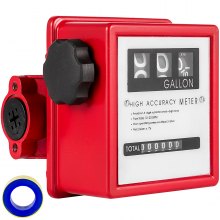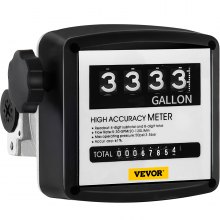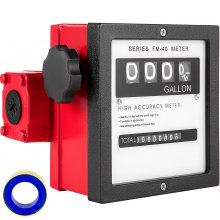Explore Fuel Meters’ Roles in Optimizing Vehicle Performance With VEVOR
In the dynamic landscape of automotive engineering, the pursuit of optimal vehicle performance stands as a perennial objective. From enhancing fuel efficiency to maximizing power output, every aspect of vehicle operation plays a pivotal role in achieving this goal.
Among the myriad components contributing to vehicle efficiency and performance, fuel meters emerge as unsung heroes, silently orchestrating the delicate balance between fuel consumption and power delivery. In this essay, we delve into the significance of fuel meters and their collaboration with VEVOR, a leading name in automotive technology, to explore how they synergistically optimize vehicle performance.
Fuel meters serve as the vital link between fuel management systems and engine performance, precisely measuring the amount of fuel injected into the combustion chamber.
Benefits of Fuel Meters
Fuel meters are essential components in any vehicle's fuel management system, serving several critical purposes that directly impact performance, efficiency, and emissions control. Here are some key reasons why fuel meters are indispensable:
Climate Control
Car blowers are important in controlling garage temperature, ensuring occupants remain comfortable regardless of the outside weather.
By moving air through a vehicle’s heating, ventilation, and air conditioning (HVAC) systems, fans help maintain a pleasant indoor environment, be it cool in the summer the warm or hot days in the cold winter
Precise Fuel Measurement
Gasoline meters aid in improving combustion by supplying the appropriate quantity of gasoline based on engine load, speed, and other characteristics. This increases power production, smoother engine running, and less fuel waste.
Emissions Control
Maintaining the proper air-fuel ratio is critical for reducing hazardous emissions, including CO, NOx, and HC. Fuel meters assist in regulating emissions by allowing exact fuel supply, which allows engines to run more cleanly and fulfill severe pollution criteria.
Diagnostic Capabilities
Some current gasoline meters include diagnostic functions that track fuel flow rates, detect irregularities, and notify drivers or technicians of potential problems. This proactive approach to car maintenance can help avoid costly repairs and maintain optimal engine performance in the long run.
Different Types Of Fuel Meters
There are several types of gasoline meters used in different sectors and purposes. Each type of fuel meter has benefits and disadvantages, and the decision is determined by criteria such as specific application requirements, flow circumstances, fuel type, accuracy requirements, and budget limits.
Engineers and end-users may choose the best fuel meter for their specific requirements by learning the features of each.
Mechanical Flow Meters
These meters are based on mechanical principles and typically use gears, generators, or turbines to measure fuel flow. They are generally simple and well-suited for measuring relatively clean fuels such as gasoline and diesel.
Flow gauges are robust and reliable but may have limitations regarding accuracy and compatibility with different fuel types.
Ultrasonic Flow Meters
Ultrasonic flow meters use ultrasonic waves to measure fuel flow. They work by emitting ultrasonic pulses into the fuel and measuring the time it takes for the pulses to rise and fall. By comparing these transit times, the meter can calculate the flow rate.
Ultrasonic flow meters are non-intrusive and can handle various fuels and flows. They are highly accurate and suitable for various applications, including automotive, oil and gas, and chemical processes.
Positive Displacement Flow Meters
Positive displacement flow meter works by capturing discrete quantities of fuel and quantifying these quantities to determine the total flow. The most common types are piston meters and elliptical gear meters.
Positive displacement meters provide high accuracy and precision, especially at low flow rates, making them ideal for applications requiring accurate measurements, such as preservation transfers and batching.
Myths vs. Realities Related To Fuel Meter Accuracy and Maintaining Gauge Efficiency
Separating facts from myths has always had a tremendous effect. Furl meters are not without their myth. However, letting these untrue sayings go far can cause miseducation. Therefore, we are here to correct some common myths regarding fuel meters.
Myth: Fuel meters are always 100% accurate.
Reality: Although fuel gauges are designed to be accurate, they are not infallible. Factors such as wear, improper installation, and changes in fuel density can affect the accuracy over time. Regular calibration and maintenance are required to ensure proper operation.
Myth: All fuel meters provide the same level of accuracy.
Reality: Different gauges and brands of fuel vary in accuracy, reliability, and performance. Factors such as design, technology, and manufacturing process can affect the meter's accuracy. Choosing a fuel gauge that meets the specific accuracy requirements of the application is important.
font-weight: 700 Myth: Fuel meter accuracy cannot be affected by external factors.
Reality: External factors such as vibration, shock, and electromagnetic interference can affect the accuracy of fuel measurements. Proper installation of meters, appropriate grounding techniques, and protection against electromagnetic interference can help minimize these effects and maintain accuracy.
Myth: Fuel meters can measure flow accurately regardless of flow rate.
Reality: Fuel meters are intended to measure flow across various flow rates, although their accuracy may vary depending on the flow rate. Some meters may have a specific operating range within which they achieve maximum accuracy. It is critical to pick a meter corresponding to the estimated flow rates for the application.
Why Choose VEVOR Fuel Meter?
With years of experience in the automotive industry, VEVOR has deep business knowledge and insight. We have experienced staff who understand the unique challenges and requirements of automotive technology. Thus, it enables us to deliver customized solutions that better meet customer needs.
VEVOR is dedicated to continuous improvement and innovation. We continually explore and improve our products, processes, and services to stay ahead of industry trends and customer expectations. With this, we ensure that customers always receive the best possible solutions.
VEVOR is committed to sustainability and environmental responsibility. We put environmentally friendly practices at the forefront of our operations and products, contributing to a sustainable, green future for the automotive industry.
FAQs About Fuel Meter
Do fuel meters require calibration?
Yes, most fuel meters require periodic calibration to ensure accuracy. Factors such as wear, environmental factors, and changes in fuel composition can affect the meter's accuracy over time. Calibration ensures that the meter remains accurate and reliable.
Can fuel meters measure different types of fuel?
Yes, many fuel meters are designed to measure a wide range of fuels, including gasoline, diesel, biodiesel, ethanol, aviation fuel, and industrial fuels. However, it’s important to choose a meter that matches your application’s specific fuel type meet and assets.
How do I install and maintain a fuel meter?
Installation and maintenance vary depending on the fuel gauge type and model. It is important to follow the manufacturer’s instructions and recommendations for proper installation, calibration, and maintenance. Regular inspection, cleaning, and calibration checks are essential to ensure calibration accuracy and prolong the meter's life.

































































